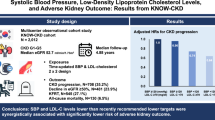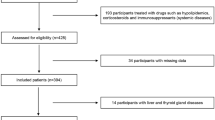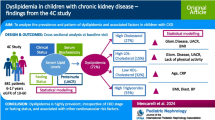Abstract
Background
Dyslipidemia can cause cardiovascular disease and increase the fatality rate among children with chronic kidney disease (CKD); this makes early screening and treatment of dyslipidemia crucial. This study aimed to assess the association between the changes in serum total cholesterol levels over time and the degree of CKD progression in children.
Methods
From April 2011 to August 2021, 379 of the 432 participants enrolled in the KoreaN cohort study for Outcomes in patients With Pediatric CKD (KNOW-PedCKD) were included and divided into 4 categories based on total cholesterol levels (< 170 mg/dL, acceptable; 170–199, borderline; 200–239, high; and ≥ 240, very high). Survival analysis using conventional and time-dependent Cox proportional hazards model were performed for a composite event of CKD progression (≥ 50% decrease in estimated glomerular filtration rate from baseline, a twofold increase in creatinine, or the occurrence of dialysis or kidney transplantation).
Result
The incidence of composite event of CKD progression was 96.3, 90.4, 87.3, and 270.6 cases per 1000 person-years in the acceptable, borderline, high, and very high categories, respectively. On using the time-dependent Cox proportional hazards model, the hazard ratio of the very high category was significantly higher than that of the acceptable category by 3.13 times as per univariate analysis and 2.37 times as per multivariate analysis.
Conclusions
Very high serum total cholesterol is a significant risk factor for CKD progression in children. Lowering total cholesterol levels below the very high category in children with CKD may delay the progression of CKD.
Graphical abstract

A higher resolution version of the Graphical abstract is available as Supplementary information


Similar content being viewed by others
Data availability
All data generated or analyzed during this study are included in this article.
References
Saland JM, Pierce CB, Mitsnefes MM, Flynn JT, Goebel J, Kupferman JC, Warady BA, Furth SL, CKiD Investigators (2010) Dyslipidemia in children with chronic kidney disease. Kidney Int 78:1154–1163
Parekh RS, Carroll CE, Wolfe RA, Port FK (2002) Cardiovascular mortality in children and young adults with end-stage kidney disease. J Pediatr 141:191–197
Groothoff JW, Gruppen MP, Offringa M, Hutten J, Lilien MR, Van De Kar NJ, Wolff ED, Davin JC, Heymans HSA (2002) Mortality and causes of death of end-stage renal disease in children: a Dutch cohort study. Kidney Int 61:621–629
Baek HS, Kim SH, Kang HG, Choi HJ, Cheong HI, Ha IS, Han KH, Cho HY, Shin JI, Park YS, Lee JH, Ahn YH, Park E, Cho MH (2020) Dyslipidemia in pediatric CKD patients: results from KNOW-PedCKD (KoreaN cohort study for Outcomes in patients With Pediatric CKD). Pediatr Nephrol 35:1455–1461
Kang HG, Choi HJ, Han KH, Kim SH, Cho HY, Cho MH, Shin JI, Lee JH, Lee J, Oh KH, Park YS, Cheong HI, Ahn C, Ha IS (2016) KNOW-Ped CKD (KoreaN cohort study for outcomes in patients with pediatric CKD): Design and methods. BMC Nephrol 17:35
Khurana M, Silverstein DM (2015) Etiology and management of dyslipidemia in children with chronic kidney disease and end-stage renal disease. Pediatr Nephrol 30:2073–2084
Saland JM, Kupferman JC, Pierce CB, Flynn JT, Mitsnefes MM, Warady BA, Furth SL (2019) Change in Dyslipidemia with Declining Glomerular Filtration Rate and Increasing Proteinuria in Children with CKD. Clin J Am Soc Nephrol 14:1711–1718
Wong CJ, Moxey-Mims M, Jerry-Fluker J, Warady BA, Furth SL (2012) CKiD (CKD in Children) Prospective Cohort Study: A Review of Current Findings. Am J Kidney Dis 60:1002–1011
Cases A, Coll E (2005) Dyslipidemia and the progression of renal disease in chronic renal failure patients. Kidney Int Suppl (99):S87–93
Rahman M, Yang W, Akkina S, Alper A, Anderson AH, Appel LJ, He J, Raj DS, Schelling J, Strauss L, Teal V, Rader DJ, CRIC Study Investigators (2014) Relation of serum lipids and lipoproteins with progression of CKD: The CRIC study. Clin J Am Soc Nephrol 9:1190–1198
Chen SC, Hung CC, Kuo MC, Lee JJ, Chiu YW, Chang JM, Hwang SJ, Chen HC (2013) Association of dyslipidemia with renal outcomes in chronic kidney disease. PLoS One 8:e55643
Tsuruya K, Yoshida H, Nagata M, Kitazono T, Iseki K, Iseki C, Fujimoto S, Konta T, Moriyama T, Yamagata K, Narita I, Kimura K, Kondo M, Asahi K, Kurahashi I, Ohashi Y, Watanabe T (2015) Impact of the Triglycerides to High-Density Lipoprotein Cholesterol Ratio on the Incidence and Progression of CKD: A Longitudinal Study in a Large Japanese Population. Am J Kidney Dis 66:972–983
Bowe B, Xie Y, Xian H, Balasubramanian S, Al-Aly Z (2016) Low levels of high-density lipoprotein cholesterol increase the risk of incident kidney disease and its progression. Kidney Int 89:886–896
Sung SA, Lee KB, Oh KH, Kim SW, Lee J, Kang SW, Choi KH, Ahn C, Han SH, KNOW‐CKD (KoreaN Cohort Study for Outcomes in Patients With Chronic Kidney Disease) Investigators (2019) Association Between Serum High-Density Lipoprotein Cholesterol Levels and Progression of Chronic Kidney Disease: Results From the KNOW-CKD. J Am Heart Assoc 8:e011162
Warady BA, Abraham AG, Schwartz GJ, Wong CS, Muñoz A, Betoko A, Mitsnefes M, Kaskel F, Greenbaum LA, Mak RH, Flynn J, Moxey-Mims MM, Furth S (2015) Predictors of Rapid Progression of Glomerular and Nonglomerular Kidney Disease in Children and Adolescents: The Chronic Kidney Disease in Children (CKiD) Cohort. Am J Kidney Dis 65:878–888
Belangero VMS, Prates LC, Watanabe A, Schvartsman BSG, Nussenzveig P, Cruz NA, Abreu ALS, Paz IP, Facincani I, Morgantetti FEC, Silva AO, Andrade OVB, Camargo MFC, Nogueira PCK (2018) Prospective cohort analyzing risk factors for chronic kidney disease progression in children. J Pediatr (Rio J) 94:525–531
Fadrowski JJ, Neu AM, Schwartz GJ, Furth SL (2011) Pediatric GFR estimating equations applied to adolescents in the general population. Clin J Am Soc Nephrol 6:1427–1435
International Society of Nephrology (2013) Chapter 1: Definition and classification of CKD. Kidney Int Suppl 3:19–62
Kim JH, Yun S, Hwang S, Shim JO, Chae HW, Lee YJ, Lee JH, Kim SC, Lim D, Yang SW, Oh K, Moon JS, Committee for the Development of Growth Standards for Korean Children and Adolescents; Committee for School Health and Public Health Statistics, the Korean Pediatric Society; Division of Health and Nutrition Survey, Korea Centers for Disease Control and Prevention (2018) The 2017 Korean National Growth Charts for children and adolescents: development, improvement, and prospects. Korean J Pediatr 61:135–149
Kopple JD (2001) National kidney foundation K/DOQI clinical practice guidelines for nutrition in chronic renal failure. Am J Kidney Dis 37:S66-70
National Kidney Foundation (2003) K/DOQI clinical practice guidelines for bone metabolism and disease in chronic kidney disease. Am J Kidney Dis 42:S1-201
Fathallah-Shaykh SA, Cramer MT (2014) Uric acid and the kidney. Pediatr Nephrol 29:999–1008
National High Blood Pressure Education Program Working Group on High Blood Pressure in Children and Adolescents (2004) The fourth report on the diagnosis, evaluation, and treatment of high blood pressure in children and adolescents. Pediatrics 114:555–576
Drüeke TB, Parfrey PS (2012) Summary of the KDIGO guideline on anemia and comment: reading between the (guide)line(s). Kidney Int 82:952–960
Expert Panel on Integrated Guidelines for Cardiovascular Health and Risk Reduction in Children and Adolescents, National Heart, Lung, and Blood Institute (2011) Expert Panel on Integrated Guidelines for Cardiovascular Health and Risk Reduction in Children and Adolescents: Summary Report. Pediatrics 128:S213–S256
Saydah S, Bullard KM, Imperatore G, Geiss L, Gregg EW (2013) Cardiometabolic risk factors among US adolescents and young adults and risk of early mortality. Pediatrics 131:e679-686
US Preventive Services Task Force (2016) Screening for Lipid Disorders in Children and Adolescents: US Preventive Services Task Force Recommendation Statement. JAMA 316:625–633
Therneau T, Crowson C, Atkinson E Using Time Dependent Covariates and Time Dependent Coefficients in the Cox Model. https://cran.r-project.org/web/packages/survival/vignettes/timedep.pdf. Accessed 7 Dec 2022
Zhang Z, Reinikainen J, Adeleke KA, Pieterse ME, Groothuis-Oudshoorn CGM (2018) Time-varying covariates and coefficients in Cox regression models. Ann Transl Med 6:121
Snapinn SM, Jiang Q, Iglewicz B (2005) Illustrating the Impact of a Time-Varying Covariate With an Extended Kaplan-Meier Estimator. Am Stat 59:301–307
Therneau TM, Crowson CS, Atkinson EJ Adjusted Survival Curves. https://www.semanticscholar.org/paper/Adjusted-Survival-Curves-Therneau-Crowson/59353b51032c2061eb2cb050a72af52568c5a2da. Accessed 8 Dec 2022
Saland JM, Ginsberg HN (2007) Lipoprotein metabolism in chronic renal insufficiency. Pediatr Nephrol 22:1095–1112
Boes E, Fliser D, Ritz E, König P, Lhotta K, Mann JF, Müller GA, Neyer U, Riegel W, Riegler P, Kronenberg F (2006) Apolipoprotein A-IV predicts progression of chronic kidney disease: the mild to moderate kidney disease study. J Am Soc Nephrol 17:528–536
Kang HM, Ahn SH, Choi P, Ko YA, Han SH, Chinga F, Park AS, Tao J, Sharma K, Pullman J, Bottinger EP, Goldberg IJ, Susztak K (2015) Defective fatty acid oxidation in renal tubular epithelial cells plays a key role in kidney fibrosis development. Nat Med 21:37–46
Lim JS, Kim EY, Kim JH, Yoo J-H, Yi KH, Chae HW, Choi J-H, Kim JY, Hwang IT (2020) 2017 Clinical practice guidelines for dyslipidemia of Korean children and adolescents. Clin Exp Pediatr 63:454
Hari P, Khandelwal P, Smoyer WE (2020) Dyslipidemia and cardiovascular health in childhood nephrotic syndrome. Pediatr Nephrol 35:1601–1619
Su X, Zhang L, Lv J, Wang J, Hou W, Xie X, Zhang H (2016) Effect of Statins on Kidney Disease Outcomes: A Systematic Review and Meta-analysis. Am J Kidney Dis 67:881–892
Sanguankeo A, Upala S, Cheungpasitporn W, Ungprasert P, Knight EL (2015) Effects of statins on renal outcome in chronic kidney disease patients: a systematic review and meta-analysis. PLoS One 10:e0132970
Sandhu S, Wiebe N, Fried LF, Tonelli M (2006) Statins for improving renal outcomes: a meta-analysis. J Am Soc Nephrol 17:2006–2016
Peduzzi P, Concato J, Feinstein AR, Holford TR (1995) Importance of events per independent variable in proportional hazards regression analysis II. Accuracy and precision of regression estimates. J Clin Epidemiol 48:1503–1510
Riley RD, Snell KI, Ensor J, Burke DL, Harrell FE Jr, Moons KG, Collins GS (2019) Minimum sample size for developing a multivariable prediction model: PART II - binary and time-to-event outcomes. Stat Med 38:1276–1296
Funding
KNOW-PedCKD (trial registration:NCT02165878-ClinicalTrials.gov) was funded by grants 2011E3300300, 2012E3301100, 2013E3301600, 2013E3301601, 2013E3301602, 2016E3300200, 2016E3300201, 2016E3300202, 2019E320100, 2019E320101, 2019E320102, and 2022–11-007 awarded by the Research of Korea Disease Control and Prevention Agency after peer review.
Author information
Authors and Affiliations
Corresponding author
Ethics declarations
Ethical approval
This study was approved by the institutional review boards of the participating centers, namely Kyungpook National University Hospital (Daegu, South Korea), Seoul National University Children’s Hospital (Seoul, South Korea), Jeju University Hospital (Jeju, South Korea), Pusan National University Children’s Hospital (Yangsan, South Korea), Severance Children’s Hospital (Seoul, South Korea), Samsung Medical Center (Seoul, South Korea), and Asan Medical Center (Seoul, South Korea). Children with CKD aged < 18 years were enrolled in this study after informed consent had been obtained from their parents or guardians.
Conflicts of interest
The authors declare that they have no conflicts of interest.
Additional information
Publisher's note
Springer Nature remains neutral with regard to jurisdictional claims in published maps and institutional affiliations.
Supplementary information
Below is the link to the electronic supplementary material.
Rights and permissions
Springer Nature or its licensor (e.g. a society or other partner) holds exclusive rights to this article under a publishing agreement with the author(s) or other rightsholder(s); author self-archiving of the accepted manuscript version of this article is solely governed by the terms of such publishing agreement and applicable law.
About this article
Cite this article
Baek, H.S., Park, M.J., Song, J.Y. et al. Association between serum total cholesterol and chronic kidney disease progression in children: results from the KNOW-PedCKD. Pediatr Nephrol 38, 4101–4109 (2023). https://doi.org/10.1007/s00467-023-06033-6
Received:
Revised:
Accepted:
Published:
Issue Date:
DOI: https://doi.org/10.1007/s00467-023-06033-6




